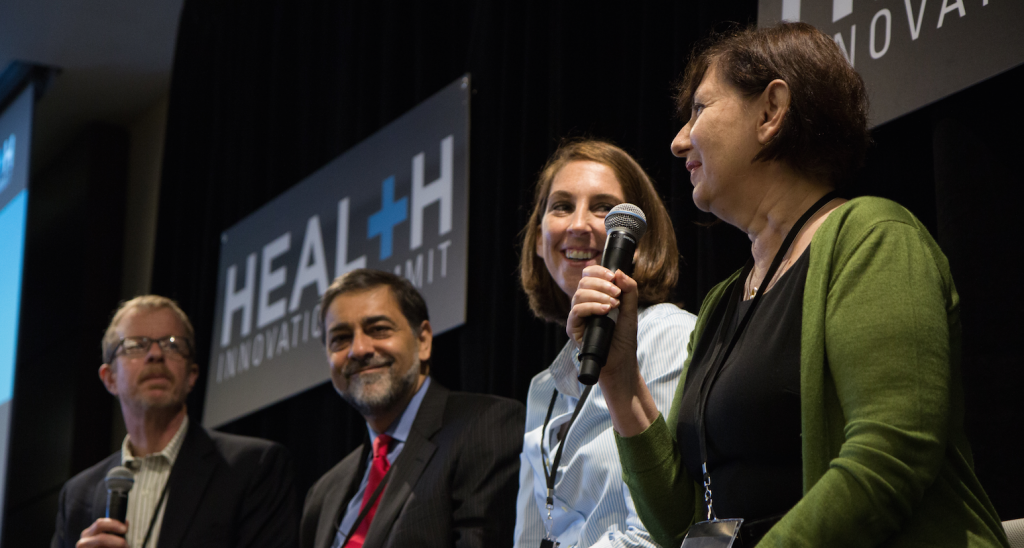4 critical debates for doctors from Health Innovation Summit 2014
Emily Peters, Vice President, Marketing Communications, Doximity
Two days of dynamic conversations at Rock Health’s 2014 Health Innovation Summit covered nearly every topic in medicine; from robotics to HIPAA reform. The packed audience included the big names you’d expect from Silicon Valley VC investor groups, payers, tech companies and health systems. On the physician side, this was the first year that someone from the AMA attended and there were a handful of physicians in the audience.
Of course, not every busy clinician could to make it out to the #HISUM conference, but thankfully, it’s not too late to join the conversation. Here’s four debates from HISUM that every physician should join:
1. Are physicians unnecessary in the future of medicine?
One of the most contentious and vibrant debates of the conference was led by Quentin Hardy of the New York Times around the big-picture disruption of healthcare. Futurists from Singularity University and Institute for the Future debated how (and whether) to bring physicians into the picture. Vivek Wadhwa insisted that artificial intelligence would replace all physicians. Marina Gorbis argued that data and apps are taking on new health care authority but that we need physicians to be the “narrative storytellers” in guiding patients through the tech-enabled findings. The gap today, according to Hardy? Current physician training focuses on “humans being trained to act like a machine” when we really need more empathy. Share your thoughts on Twitter.
2. Do physicians care enough about healthcare costs?
Elisabeth Rosenthal was among the conference’s most powerful speakers. With her history as an emergency physician and now as a journalist reporting on health costs for the New York Times, Rosenthal brought a pragmatic, human perspective to the challenges of the US healthcare system. Her anger focused largely on the regulatory and system challenges that make the US healthcare system the world’s most expensive, but at the same time she was frustrated at what she sees as a lack of physician awareness or concern about costs. A physician in the audience responded on Twitter:
“Listening to @nytrosenthal and realizing how little I know as an MD about how my actions impact $ spent by pts. #hisum #transparency” –@teresatuan
Do you use GoodRX to look up prescription costs in your clinical practice? Is Rosenthal right to ask physicians to be more cost aware? Join this debate on Twitter.
3. Do physicians or patients want “Uber-for-health” more?
Physician interest in telemedicine and housecall technologies is outpacing patient demand according to the founders of Doctor on Demand (telemedicine visits) and Pager (housecalls on demand), who both reported waiting lists of a “couple thousand” doctors. Which doctors are most interested? Physicians who just graduated or those close to retirement and physicians in private practice looking to expand. The trouble? So far, these services are just for urgent care and strictly cash pay. Are you optimistic about the future of these on-demand care delivery platforms for your own medical practice? Do you think doctors are really lining up to work with these services? Dive in and explore this debate on Twitter.
4. Are robots going to replace surgeons?
Dr. Babak Parviz, one of the inventors of Google Glass, spoke on the “Augmented Humanity” panel about his vision for the future included surgery being completely replaced by machines. “Close your eyes and imagine the world 50 years from now, surgery will be done with robots. Human physicians will make a decision, robots will plan a surgery, humans will approve, robots will do it,” Parviz said.
Panelists on the second day took a more measured approach, with Catherine Mohr of Intuitive Surgical stating that surgical robots can help physicians “take on a set of superpowers” as an extension of the surgeon, not an autonomous device. Share your thoughts with the Twitterverse.
Did these questions anger you? Make you think? Good! We need physicians to get involved in the discussion. Get on Twitter, reach out to these panelists and reporters to have your perspective heard.
Emily Peters is VP, Marketing Communications at Doximity. A former member of the founding team at Practice Fusion, she has been working to connect physicians with the latest digital health innovation since 2009. She was invited by Rock Health to be a “citizen reporter” for the event, representing the physician audience for Doximity’s network.
